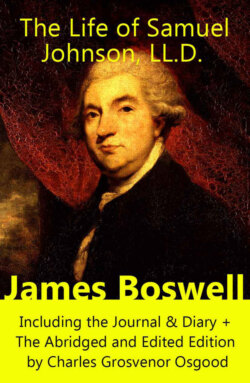Читать книгу The Life of Samuel Johnson, LL.D. - James Boswell - Страница 26
На сайте Литреса книга снята с продажи.
‘SAM. JOHNSON.’
ОглавлениеIt should seem from this letter, though subscribed with his own name, that he had not yet been introduced to Mr. Cave. We shall presently see what was done in consequence of the proposal which it contains.
[Page 108: Irene. A.D. 1737.]
In the course of the summer he returned to Lichfield, where he had left Mrs. Johnson, and there he at last finished his tragedy, which was not executed with his rapidity of composition upon other occasions, but was slowly and painfully elaborated. A few days before his death, while burning a great mass of papers, he picked out from among them the original unformed sketch of this tragedy, in his own hand-writing, and gave it to Mr. Langton, by whose favour a copy of it is now in my possession. It contains fragments of the intended plot, and speeches for the different persons of the drama, partly in the raw materials of prose, partly worked up into verse; as also a variety of hints for illustration, borrowed from the Greek, Roman, and modern writers. The hand-writing is very difficult to be read, even by those who were best acquainted with Johnson’s mode of penmanship, which at all times was very particular. The King having graciously accepted of this manuscript as a literary curiosity, Mr. Langton made a fair and distinct copy of it, which he ordered to be bound up with the original and the printed tragedy; and the volume is deposited in the King’s library[314]. His Majesty was pleased to permit Mr. Langton to take a copy of it for himself.
The whole of it is rich in thought and imagery, and happy expressions; and of the disjecta membra[315] scattered throughout, and as yet unarranged, a good dramatick poet might avail himself with considerable advantage. I shall give my readers some specimens of different kinds, distinguishing them by the Italick character.
‘Nor think to say, here will I stop,
Here will I fix the limits of transgression,
Nor farther tempt the avenging rage of heaven.
When guilt like this once harbours in the breast,
Those holy beings, whose unseen direction
Guides through the maze of life the steps of man,
Fly the detested mansions of impiety,
And quit their charge to horrour and to ruin.’
A small part only of this interesting admonition is preserved in the play, and is varied, I think, not to advantage:
‘The soul once tainted with so foul a crime,
No more shall glow with friendship’s hallow’d ardour,
Those holy beings whose superior care
Guides erring mortals to the paths of virtue,
Affrighted at impiety like thine,
Resign their charge to baseness and to ruin[316].’
‘_I feel the soft infection
Flush in my cheek, and wander in my veins.
Teach me the Grecian arts of soft persuasion.’
‘Sure this is love, which heretofore I conceived the dream of idle maids, and wanton poets.’
‘Though no comets or prodigies foretold the ruin of Greece, signs which heaven must by another miracle enable us to understand, yet might it be foreshewn, by tokens no less certain, by the vices which always bring it on_.’
This last passage is worked up in the tragedy itself, as follows:
